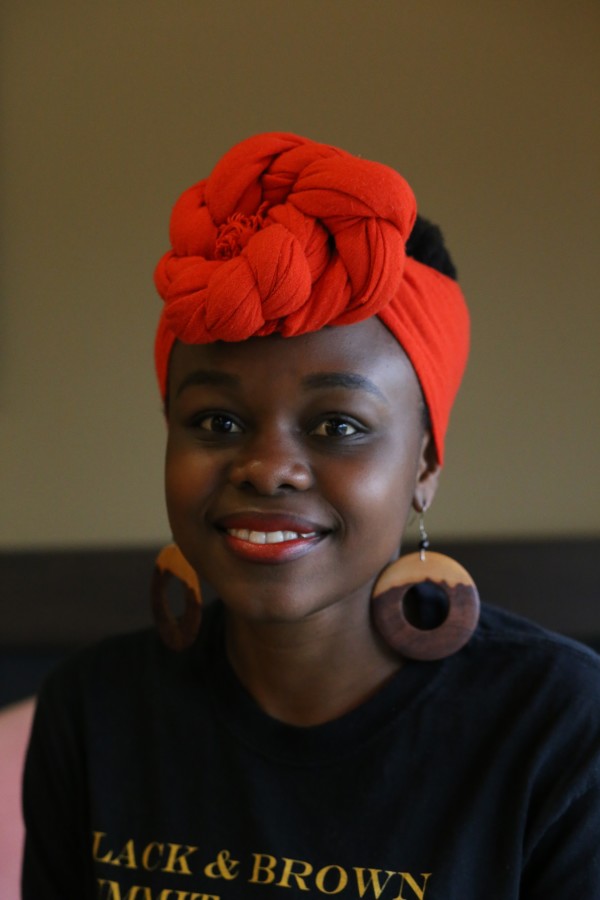When selected as one of Africa’s Most Outstanding Emerging Women Leaders by the Moremi Initiative for Women’s Leadership in Africa, Florence Takaendesa decided to put the $1,000 grant toward building an educational center in her hometown of Chitungwiza, Zimbabwe.
“In my community we used to have playgrounds and areas where kids could go and have fun playing, but now almost every piece of land is being turned residential,” Takaendesa said. “The houses are being clustered together so that there’s no room for kids to be able to do anything when they are out of school.”
Takaendesa said her time spent volunteering off-campus at Patchwork Central inspired her to create a similar place where children can learn and grow after school. The educational center would contain a library with books and computers along with a secure place for kids to play safely.
“We have a community library, which is very old and simple, and that’s all just books and nothing technical,” Takaendesa said. “I came here and saw how the U.S. is different when it comes to learning about computers at a very early age.”
Takaendesa works with a team of friends who have studied subjects related to community development, such as social work. They are currently trying to secure land so they can begin partnering with corporations in Zimbabwe to gain further funds for Takaendesa’s project.
“I want the educational center to be in my community and to stay there as long as possible,” Takaendesa said.
The junior mathematics major said she hopes to work on Wall Street and become Minister of Finance in Zimbabwe.
Takaendesa said that she felt both surprised and honored when she learned that she was chosen by the Moremi Initiative, along with 26 other women, out of 3,020 applicants from 44 countries.
Throughout high school, Takaendesa advocated for children’s rights. Some of the issues that she dealt with were child abuse, school dropout rates and drug use.
She was also a part of her community’s Junior Council, which was a version of the town council for high school students. While she served as the chief of committees clerk, the group raised funds for children’s homes and campaigned to raise awareness about child abuse.
“Now it’s easier to use social media to advocate for something, but back home I was doing the groundwork, visiting schools and such,” Takaendesa said.
After high school, Takaendesa worked for a year before college. In that time she volunteered at a child care center in Chiedza, Zimbabwe. She taught classes, helped students with homework, and met with a group of girls to make art projects out of recyclable materials.
Takaendesa said she remains dedicated to community service. She is the president of International Club and also helped found Kesho, a student organization dedicated to the advancement of women.
“Kesho is aimed at empowering, supporting and educating women in marginalized areas and developing countries,” Takaendesa said. “Some of the projects that Kesho has been doing are to help kids in Syria.”
Kesho came out of a committed group of women, including Takaendesa, who wanted to work together on common goals and common visions, said Heidi Gregori-Gahan, assistant provost for International Programs and Services.
“At first the group was called Women Making a Difference or WMDs as a joke,” Gregori-Gahan said. “The first serious name was Athena, but that was used so frequently for things that the young women eventually decided to call themselves Kesho because that means ‘tomorrow’ in Swahili.”
Gregori-Gahan said Takaendesa was the first student to attend the university with the U.S. Student Achievers Scholarship.
“We knew from the beginning how special she was,” Gregori-Gahan said. “It’s so beautiful to see that she’s worked hard and received some awards and honors, and that’s really helped her to believe in herself now.”
Takaendesa’s mother had to sacrifice a lot to keep her in school and afford her uniform and books, Gregori-Gahan said.
“(Takaendesa) is a very resilient, persistent, strong and focused young woman. On top of that she has the empathy quality that really makes a good leader, because she’s been there herself,” Gregori-Gahan said. “That instilled in her the compassion to want to help other people.”



